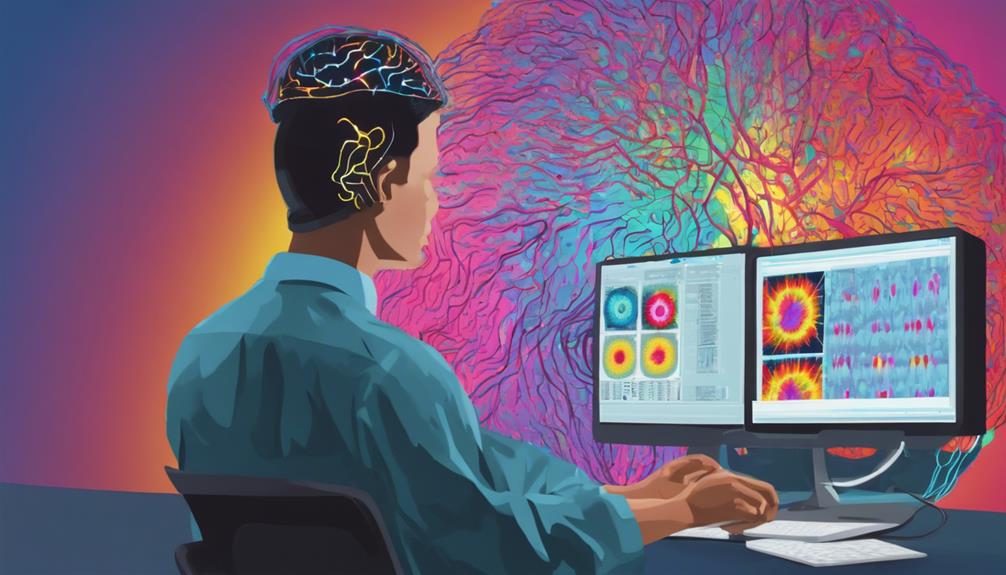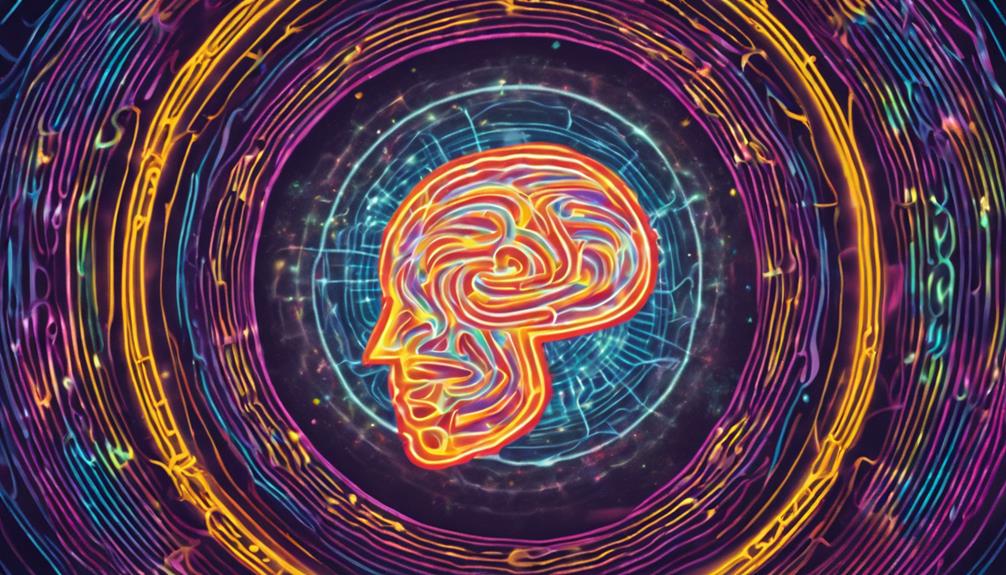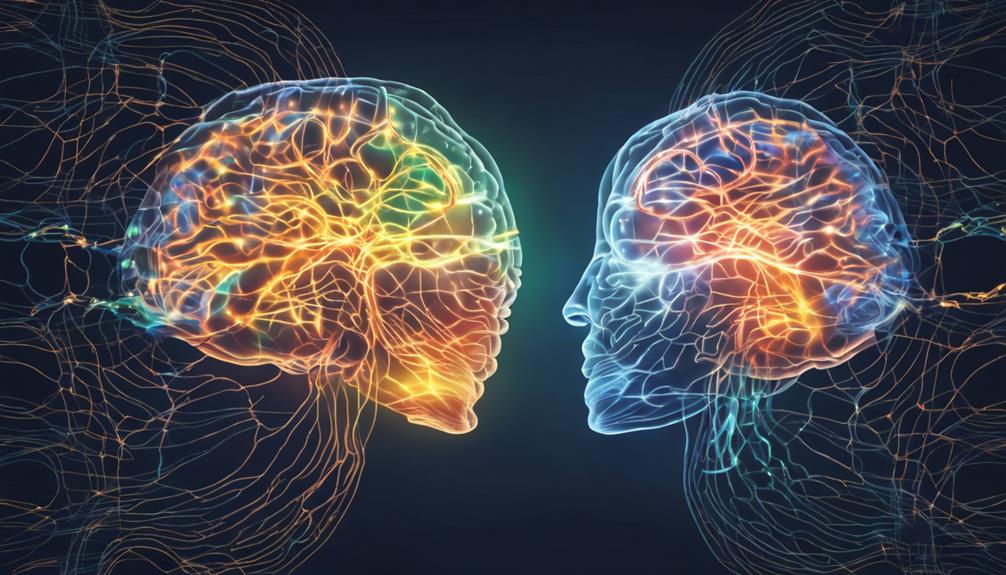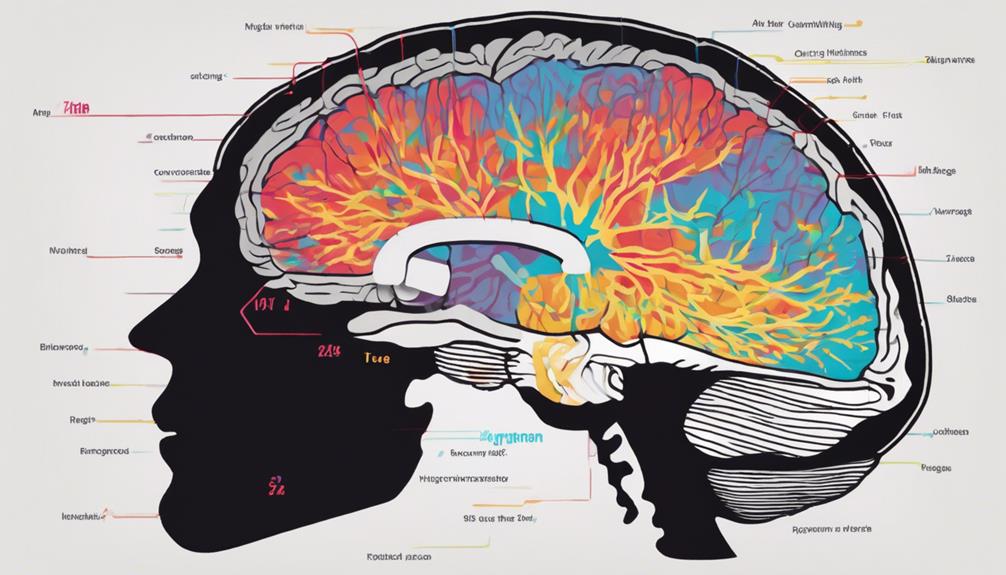Explore the captivating link between hypnosis and neuroscientific findings. Neuroimaging studies highlight specific brain activity changes during hypnosis. The prefrontal cortex plays a pivotal role in attention regulation and susceptibility to suggestions. Altered states during hypnosis exhibit unique brain wave patterns and perception shifts. Neurotransmitters like dopamine and GABA influence hypnotic responsiveness. Connectivity shifts within brain networks reveal insights into the neural mechanisms at play. Understanding these intricate connections provides a deeper understanding of how brain activity functions in altered states of consciousness.
Neuroimaging Studies on Hypnotized Individuals

Neuroimaging studies on hypnotized individuals have provided valuable insights into the neural mechanisms underlying the hypnotic state. These studies have revealed specific neural correlates associated with hypnotic susceptibility and suggest alterations in cognitive control processes during hypnosis. Functional magnetic resonance imaging (fMRI) studies have shown changes in brain activity patterns, particularly in regions involved in attention, perception, and self-awareness.
The neural correlates of hypnosis are often linked to alterations in the default mode network (DMN) and the executive control network (ECN). The DMN, responsible for introspection and self-referential thoughts, shows decreased activity during hypnosis. Conversely, the ECN, associated with cognitive control and attention, exhibits increased connectivity in hypnotized individuals. These findings suggest a shift in cognitive control processes during hypnosis, with a potential reorganization of neural networks to facilitate suggestibility and altered states of consciousness.
Understanding the neural underpinnings of hypnosis through neuroimaging studies provides valuable insights into the complex interplay between cognitive control processes and altered states of consciousness.
Role of Prefrontal Cortex in Hypnosis
Studies examining the role of the prefrontal cortex in hypnosis have shed light on its contribution to the cognitive processes and neural mechanisms underlying this altered state of consciousness.
The prefrontal cortex, a region associated with cognitive control, plays a crucial role in regulating attention modulation during hypnosis. Research has indicated that during hypnotic trance, there is a decrease in prefrontal cortex activity, suggesting a reduced involvement in executive functions such as decision-making and self-awareness. This decrease in prefrontal cortex activity may lead to a state of heightened suggestibility and responsiveness to hypnotic suggestions.
Moreover, the prefrontal cortex is implicated in monitoring and regulating attention, which is essential for focusing awareness during hypnosis. By modulating attention, the prefrontal cortex may facilitate the absorption of hypnotic suggestions and the induction of trance-like states.
Understanding the role of the prefrontal cortex in hypnosis provides valuable insights into the neural basis of cognitive control and attention modulation in altered states of consciousness.
Altered States of Consciousness in Hypnotic Trance

The induction of a hypnotic trance involves the emergence of altered states of consciousness characterized by heightened suggestibility and a shift in attentional focus. Research on altered states of consciousness in hypnotic trance has shown changes in brain wave patterns, with an increase in theta waves associated with deep relaxation and focused attention. These altered brain wave patterns reflect the unique neural activity present during hypnosis.
Furthermore, individuals in a hypnotic trance often experience altered perceptions, such as distortions in time perception or heightened sensory experiences. These changes in perception can be linked to alterations in neural processing and connectivity within the brain.
Studies using neuroimaging techniques have demonstrated that during hypnosis, there is decreased activity in the default mode network, which is associated with self-referential thoughts and mind-wandering. This deactivation may contribute to the heightened suggestibility and focused attention observed in individuals under hypnosis.
Neurotransmitters and Hypnotic Susceptibility
Emerging research suggests a potential correlation between specific neurotransmitters and individual differences in hypnotic susceptibility levels. Neurotransmitter interactions play a crucial role in modulating brain activity, ultimately affecting hypnotic suggestibility.
Studies have indicated that neurotransmitters such as dopamine, serotonin, and gamma-aminobutyric acid (GABA) may influence an individual's responsiveness to hypnotic suggestions. For example, dopamine, known for its role in reward and motivation, has been linked to increased hypnotic susceptibility. Higher dopamine levels have been associated with enhanced focus and suggestibility during hypnosis sessions.
On the other hand, serotonin, a neurotransmitter involved in mood regulation, may impact an individual's ability to enter a hypnotic trance. Additionally, GABA, the primary inhibitory neurotransmitter in the brain, has been implicated in modulating hypnotic responsiveness by regulating neuronal excitability.
Understanding the intricate relationship between neurotransmitters and hypnotic susceptibility can provide valuable insights into the underlying mechanisms of hypnosis and pave the way for personalized approaches to enhance therapeutic outcomes.
Brain Connectivity Changes During Hypnosis

Brain connectivity patterns exhibit notable changes in response to hypnotic induction, reflecting alterations in neural communication and network dynamics. Functional connectivity, which refers to the temporal correlation between spatially distant neurophysiological events, plays a crucial role in understanding these alterations during hypnosis.
Studies using functional magnetic resonance imaging (fMRI) have shown that hypnosis can modulate functional connectivity within and between brain networks. Specifically, the default mode network (DMN), associated with self-referential thoughts and mind-wandering, has been found to undergo significant changes during hypnotic states.
During hypnosis, there is a decrease in DMN activity and connectivity, suggesting a decoupling of self-referential processing and introspective thoughts. Simultaneously, other brain networks involved in attention, cognitive control, and sensorimotor processing may exhibit increased connectivity, indicating a shift towards more externally focused attention and reduced self-referential cognition.
These alterations in functional connectivity provide valuable insights into the neural mechanisms underlying hypnosis and its effects on cognition and perception.
Frequently Asked Questions
Can Hypnosis Help With Memory Improvement?
Hypnosis has shown potential in aiding memory enhancement by influencing cognitive function. Research suggests that hypnosis can improve recall abilities, potentially through enhancing focus and reducing distractions. Further studies are needed to establish its efficacy conclusively.
Are There Any Risks Associated With Hypnosis?
Potential dangers associated with hypnosis include false memories, emotional distress, or susceptibility to suggestion. Ethical concerns arise regarding informed consent, practitioner qualifications, and misuse. Understanding these risks is crucial for safe and effective hypnosis practices.
How Long Does It Take to See Results From Hypnosis?
The timeframe for results in hypnosis varies based on individual response. Typically, some individuals may see improvements after a few sessions, while others might require more time. Hypnosis has shown effectiveness in addressing various conditions.
Can Hypnosis Be Used to Treat Phobias Effectively?
Hypnosis can be effective in treating phobias by targeting fear conditioning mechanisms in the brain. Through suggestions and imagery, hypnotherapy aims to reduce anxiety levels associated with specific phobias, fostering gradual desensitization and symptom alleviation.
Is There a Genetic Component to Hypnotic Susceptibility?
Genetic predisposition plays a significant role in hypnotic susceptibility, contributing to the variability in individuals' hypnotic response. Studies indicate that certain genes may influence an individual's likelihood of being highly susceptible to hypnosis, highlighting a genetic basis for this trait.
Conclusion
In conclusion, harnessing neuroscientific insights in hypnosis can provide valuable information about brain activity during hypnotic trance.
Neuroimaging studies have shown alterations in brain connectivity and the involvement of the prefrontal cortex in hypnosis.
Understanding the role of neurotransmitters and the induction of altered states of consciousness can further enhance our knowledge of hypnotic susceptibility.
Overall, utilizing neuroscientific approaches can offer a deeper understanding of the neural mechanisms underlying hypnosis.


